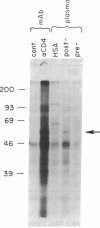Abstract
Rhesus monkeys infected with the simian immunodeficiency virus of macaques (SIVmac) demonstrate significant virologic and clinical improvement as a result of treatment with human recombinant soluble CD4 (rsCD4). We show that human rsCD4 does not efficiently inhibit SIVmac replication in bone marrow macrophages of rhesus monkeys and does not significantly augment bone marrow hematopoietic colony formation in vitro. However, plasma of human rsCD4-treated rhesus monkeys does exhibit significant anti-SIVmac activity in vitro. Plasma of these animals efficiently blocks SIVmac replication in peripheral blood lymphocytes and bone marrow macrophages. It also increases granulocyte/macrophage colony formation in vitro by bone marrow cells of SIVmac-infected monkeys. This plasma and the IgG fraction of plasma from a rhesus monkey immunized with human rsCD4 in adjuvant demonstrate reactivity with a soluble form of the rhesus monkey CD4 molecule, exhibit binding to CD4+ but not CD8+ concanavalin A-activated rhesus monkey peripheral blood lymphocytes, and precipitate the CD4 molecule from surface-labeled activated rhesus monkey peripheral blood lymphocytes. Moreover, anti-viral activity is demonstrable in the IgG fraction of plasma from a human rsCD4-immunized monkey. These studies raise the possibility that a modified human CD4 molecule serving as an immunogen might elicit an antibody response that could potentially induce a beneficial therapeutic response in human immunodeficiency virus-infected individuals.
Full text
PDF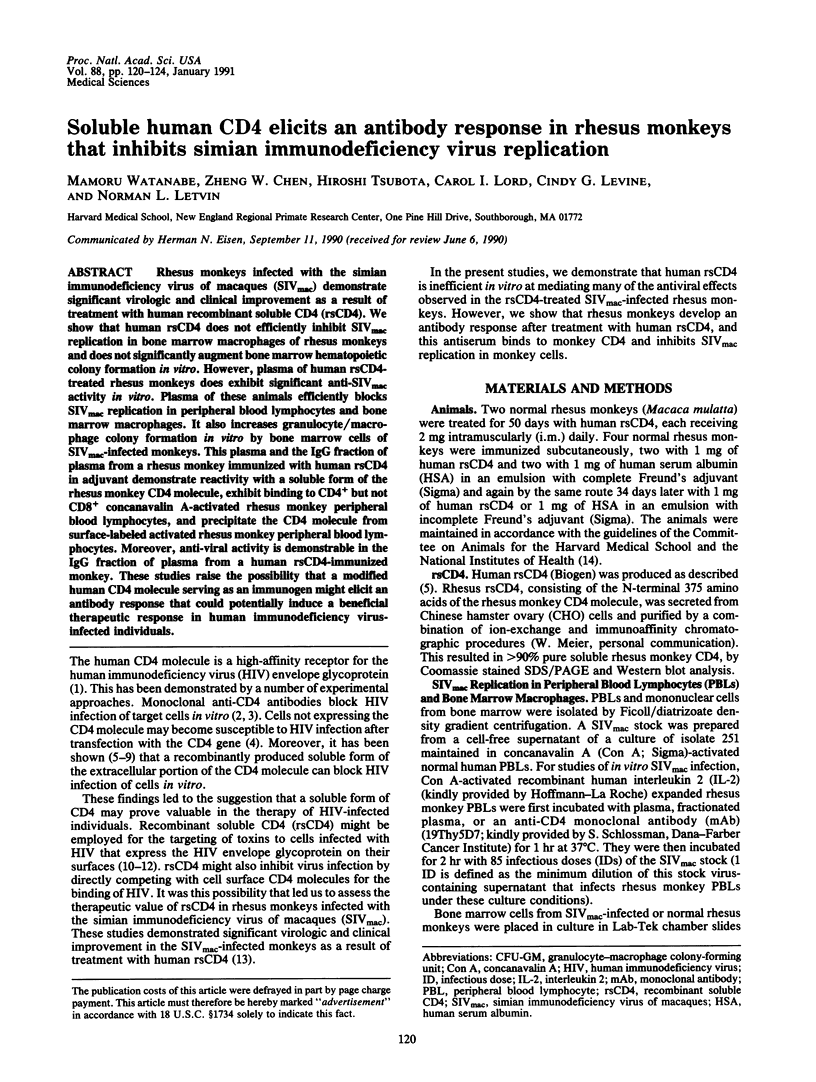
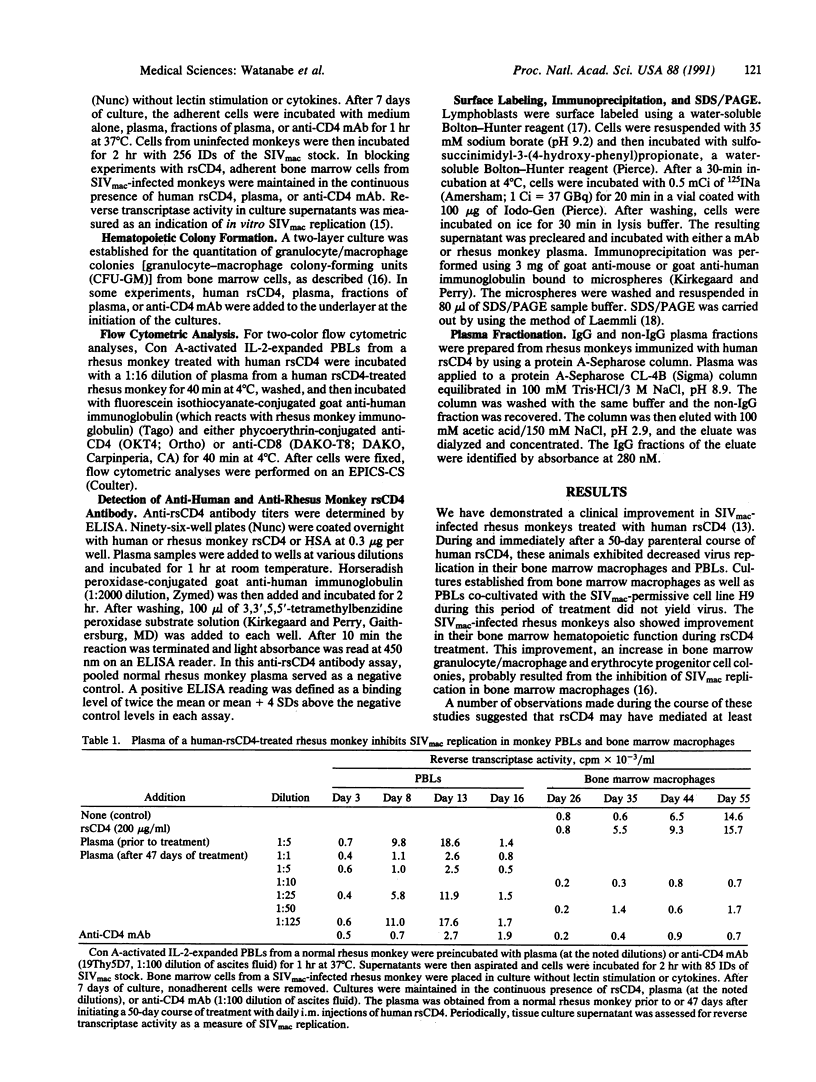
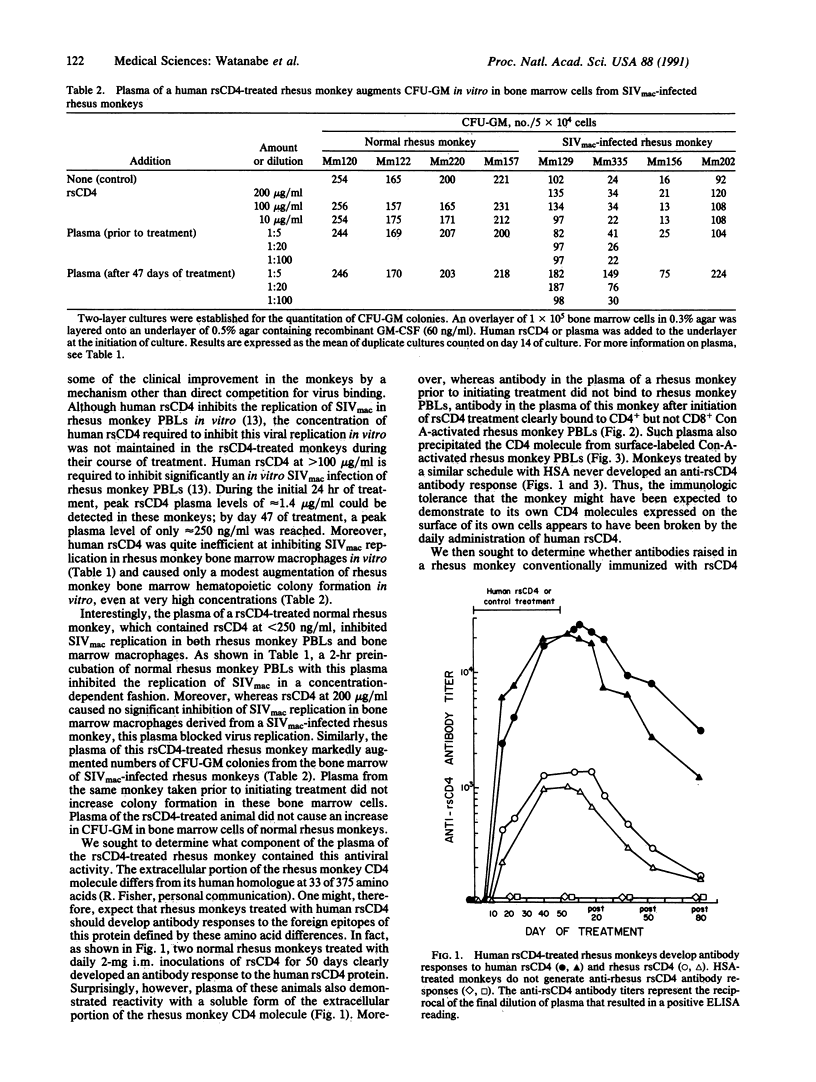
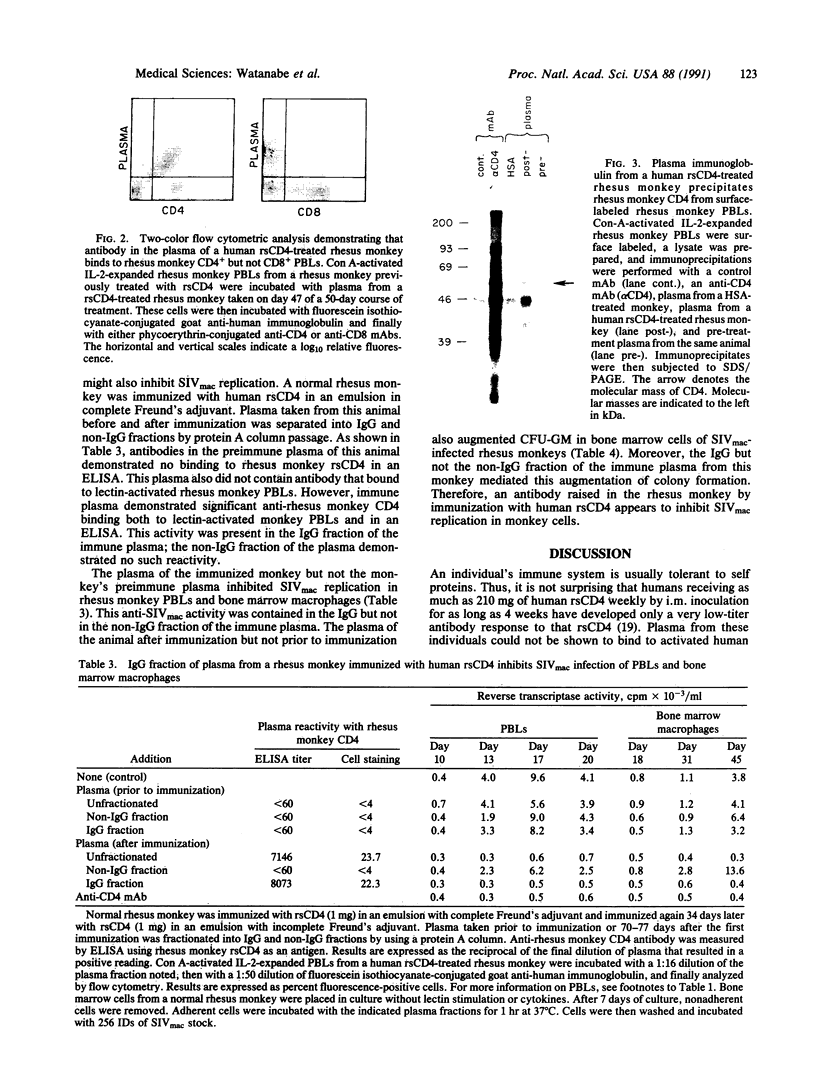
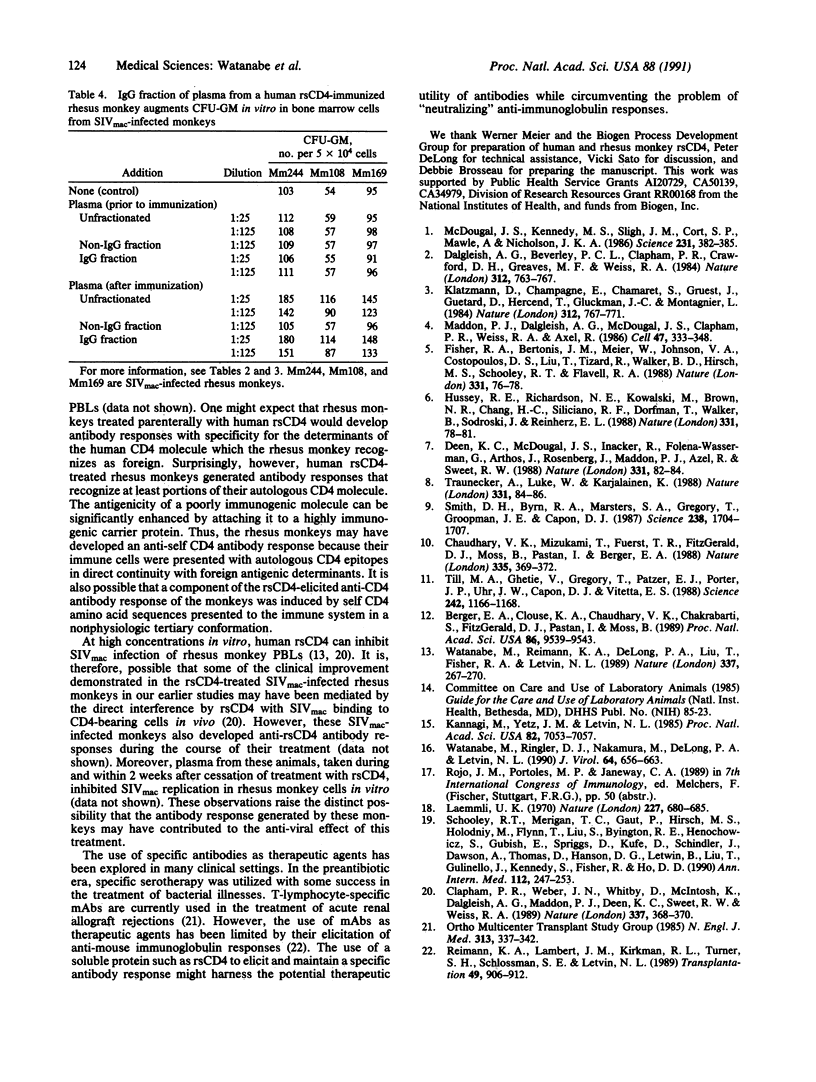
Images in this article
Selected References
These references are in PubMed. This may not be the complete list of references from this article.
- Berger E. A., Clouse K. A., Chaudhary V. K., Chakrabarti S., FitzGerald D. J., Pastan I., Moss B. CD4-Pseudomonas exotoxin hybrid protein blocks the spread of human immunodeficiency virus infection in vitro and is active against cells expressing the envelope glycoproteins from diverse primate immunodeficiency retroviruses. Proc Natl Acad Sci U S A. 1989 Dec;86(23):9539–9543. doi: 10.1073/pnas.86.23.9539. [DOI] [PMC free article] [PubMed] [Google Scholar]
- Chaudhary V. K., Mizukami T., Fuerst T. R., FitzGerald D. J., Moss B., Pastan I., Berger E. A. Selective killing of HIV-infected cells by recombinant human CD4-Pseudomonas exotoxin hybrid protein. Nature. 1988 Sep 22;335(6188):369–372. doi: 10.1038/335369a0. [DOI] [PubMed] [Google Scholar]
- Clapham P. R., Weber J. N., Whitby D., McIntosh K., Dalgleish A. G., Maddon P. J., Deen K. C., Sweet R. W., Weiss R. A. Soluble CD4 blocks the infectivity of diverse strains of HIV and SIV for T cells and monocytes but not for brain and muscle cells. Nature. 1989 Jan 26;337(6205):368–370. doi: 10.1038/337368a0. [DOI] [PubMed] [Google Scholar]
- Dalgleish A. G., Beverley P. C., Clapham P. R., Crawford D. H., Greaves M. F., Weiss R. A. The CD4 (T4) antigen is an essential component of the receptor for the AIDS retrovirus. Nature. 1984 Dec 20;312(5996):763–767. doi: 10.1038/312763a0. [DOI] [PubMed] [Google Scholar]
- Deen K. C., McDougal J. S., Inacker R., Folena-Wasserman G., Arthos J., Rosenberg J., Maddon P. J., Axel R., Sweet R. W. A soluble form of CD4 (T4) protein inhibits AIDS virus infection. Nature. 1988 Jan 7;331(6151):82–84. doi: 10.1038/331082a0. [DOI] [PubMed] [Google Scholar]
- Fisher R. A., Bertonis J. M., Meier W., Johnson V. A., Costopoulos D. S., Liu T., Tizard R., Walker B. D., Hirsch M. S., Schooley R. T. HIV infection is blocked in vitro by recombinant soluble CD4. Nature. 1988 Jan 7;331(6151):76–78. doi: 10.1038/331076a0. [DOI] [PubMed] [Google Scholar]
- Hussey R. E., Richardson N. E., Kowalski M., Brown N. R., Chang H. C., Siliciano R. F., Dorfman T., Walker B., Sodroski J., Reinherz E. L. A soluble CD4 protein selectively inhibits HIV replication and syncytium formation. Nature. 1988 Jan 7;331(6151):78–81. doi: 10.1038/331078a0. [DOI] [PubMed] [Google Scholar]
- Kannagi M., Yetz J. M., Letvin N. L. In vitro growth characteristics of simian T-lymphotropic virus type III. Proc Natl Acad Sci U S A. 1985 Oct;82(20):7053–7057. doi: 10.1073/pnas.82.20.7053. [DOI] [PMC free article] [PubMed] [Google Scholar]
- Klatzmann D., Champagne E., Chamaret S., Gruest J., Guetard D., Hercend T., Gluckman J. C., Montagnier L. T-lymphocyte T4 molecule behaves as the receptor for human retrovirus LAV. Nature. 1984 Dec 20;312(5996):767–768. doi: 10.1038/312767a0. [DOI] [PubMed] [Google Scholar]
- Laemmli U. K. Cleavage of structural proteins during the assembly of the head of bacteriophage T4. Nature. 1970 Aug 15;227(5259):680–685. doi: 10.1038/227680a0. [DOI] [PubMed] [Google Scholar]
- Maddon P. J., Dalgleish A. G., McDougal J. S., Clapham P. R., Weiss R. A., Axel R. The T4 gene encodes the AIDS virus receptor and is expressed in the immune system and the brain. Cell. 1986 Nov 7;47(3):333–348. doi: 10.1016/0092-8674(86)90590-8. [DOI] [PubMed] [Google Scholar]
- McDougal J. S., Kennedy M. S., Sligh J. M., Cort S. P., Mawle A., Nicholson J. K. Binding of HTLV-III/LAV to T4+ T cells by a complex of the 110K viral protein and the T4 molecule. Science. 1986 Jan 24;231(4736):382–385. doi: 10.1126/science.3001934. [DOI] [PubMed] [Google Scholar]
- Reimann K. A., Turner S., Lambert J. M., Reed M. H., Schlossman S. F., Letvin N. L. In vivo administration of lymphocyte-specific monoclonal antibodies in nonhuman primates. V. Evidence that humoral immune response to monoclonal antibodies and immunotoxin conjugates abrogates their cytotoxic activity. Transplantation. 1989 Dec;48(6):906–912. doi: 10.1097/00007890-198912000-00003. [DOI] [PubMed] [Google Scholar]
- Schooley R. T., Merigan T. C., Gaut P., Hirsch M. S., Holodniy M., Flynn T., Liu S., Byington R. E., Henochowicz S., Gubish E. Recombinant soluble CD4 therapy in patients with the acquired immunodeficiency syndrome (AIDS) and AIDS-related complex. A phase I-II escalating dosage trial. Ann Intern Med. 1990 Feb 15;112(4):247–253. doi: 10.7326/0003-4819-112-4-247. [DOI] [PubMed] [Google Scholar]
- Smith D. H., Byrn R. A., Marsters S. A., Gregory T., Groopman J. E., Capon D. J. Blocking of HIV-1 infectivity by a soluble, secreted form of the CD4 antigen. Science. 1987 Dec 18;238(4834):1704–1707. doi: 10.1126/science.3500514. [DOI] [PubMed] [Google Scholar]
- Till M. A., Ghetie V., Gregory T., Patzer E. J., Porter J. P., Uhr J. W., Capon D. J., Vitetta E. S. HIV-infected cells are killed by rCD4-ricin A chain. Science. 1988 Nov 25;242(4882):1166–1168. doi: 10.1126/science.2847316. [DOI] [PubMed] [Google Scholar]
- Traunecker A., Lüke W., Karjalainen K. Soluble CD4 molecules neutralize human immunodeficiency virus type 1. Nature. 1988 Jan 7;331(6151):84–86. doi: 10.1038/331084a0. [DOI] [PubMed] [Google Scholar]
- Watanabe M., Reimann K. A., DeLong P. A., Liu T., Fisher R. A., Letvin N. L. Effect of recombinant soluble CD4 in rhesus monkeys infected with simian immunodeficiency virus of macaques. Nature. 1989 Jan 19;337(6204):267–270. doi: 10.1038/337267a0. [DOI] [PubMed] [Google Scholar]
- Watanabe M., Ringler D. J., Nakamura M., DeLong P. A., Letvin N. L. Simian immunodeficiency virus inhibits bone marrow hematopoietic progenitor cell growth. J Virol. 1990 Feb;64(2):656–663. doi: 10.1128/jvi.64.2.656-663.1990. [DOI] [PMC free article] [PubMed] [Google Scholar]




